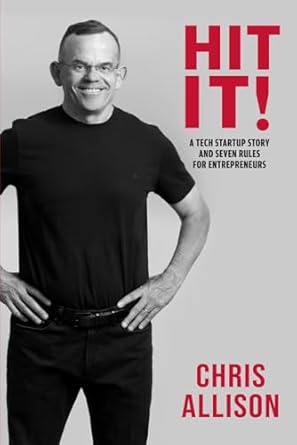Build to Last, Not to Flip: Why Longevity Beats IPO Glory
by Chris Allison

Carol Burnett once said, "Giving birth is like taking your lower lip and forcing it over your head." I’ve never given birth, but starting a company feels about the same.
Time softens the memory of pain. Like mothers who forget the labor but remember the joy, I recall the laughter of my team more than the chaos we survived. In the moment, it’s hard to appreciate the ride; you’re too deep in the grind. I often wish H. G. Wells’ "Time Machine" were real so I could revisit those early years armed with what I know now.
Would we have seen that our first two products lacked the spark to succeed?
If my father had lived, might he have guided us to greater ideas?
Was my constant hair-on-fire urgency brilliance—or noise?
If we had understood our market better, would we have avoided selling so much equity so cheaply?
Was our youthful management team our strength or our blind spot?
Every semester I teach entrepreneurship, danger lurks. The stories, the energy, the raw optimism of my students always tempt me to start another company.
One morning over breakfast I told Jane, “Next time you go to the basement, grab a three-wood from my golf bag.”
She looked puzzled. “You know I don’t play golf. Which one is that?”
“Doesn’t matter,” I said.
“And what do you want me to do with it?”
“Hit me in the head with it—I’m thinking of starting another company.”
After she stopped laughing, she asked, “Just for laughs, how would you start it?”
“Easy,” I said.
First, I’d spend six months visiting our telecom customers, asking for the five biggest pains they face.
Then I’d gather a few trusted R&D folks to brainstorm hardware or software to fix those pains.
We’d build the product with the largest addressable market and the best payback.
We’d fund it ourselves. Management would own the company.
We’d build it to last, not to flip—running it for the long haul and paying dividends instead of chasing IPO glory.
It’s a good plan. But I know myself. I’d be a lousy CEO now. The fire that once fueled me burns lower, and that’s okay. I’ve buried enough acorns to survive many winters. I don’t do stress anymore. Stress kills. I’m convinced I’ll live longer because I left Tollgrade when I did.
But you could do it. You wouldn’t be reading this if you didn’t have that entrepreneurial spark.
These days, I channel mine into teaching young entrepreneurs and hanging out with some smart economists at Allegheny College. Economists love talking about scarcity and trade-offs. Looking back, what my team created was rare, but we didn’t recognize it. Nor did our investors. We had choices we never considered.
I once discussed this with one of our original investors—a longtime Tollgrade board member.
“It’s great that we went public, huh?” he said.
“Maybe,” I shrugged.
“What do you mean?”
“Between 1995 and 2006 we generated $180 million in cash from operations. Being public cost us about $2 million a year in fees—call it an even $200 million. We could have paid ourselves dividends instead of going public.”
He looked at me. “Hmm.”
The point?
The difference between not enough and enough is profound. The difference between enough and running up the score isn’t.
Think about how we actually spend life:
- Twenty years sleeping.
- Five years in the bathroom.
- Eighty percent of what’s left—working.
So build your company to last, not to flip.
Look at Pittsburgh’s great family businesses—Giant Eagle, Sheetz, Industrial Scientific, 84 Lumber. Still thriving, still private. Compare that to once-mighty tech darlings—Fore Systems, Freemarkets, Automated Healthcare, Avere Systems—each eventually absorbed by larger firms. Even Tollgrade was bought and sold twice within five years of my retirement.
Our early stakeholders earned great returns, but when you ask what they remember most, it’s the ride. Many wish they were still on it—because some people genuinely love roller coasters.
Ralph Waldo Emerson said, “Life is a journey, not a destination.”
Entrepreneurship is the same. The real reward isn’t the money; it’s the ride.
After you’ve made your pile, you need a purpose. Maybe you love the work itself—so why stop?
Mark Twain said, “The two most important days in your life are the day you are born and the day you find out why.”
You need a reason to get out of bed every morning. For some, continuing to run their company and pay themselves dividends is that reason.
If you build a valuable company meant to last, don’t worry—buyers will find you. As my buddy Joel Adams says, “Companies are bought, not sold.”
So, what are you waiting for?
Let’s Hit It!
Chris Allison, Co-Founder and CEO of Tollgrade Communications, Inc., teaches business at Allegheny College in Meadville, PA and is the author of the new book, Hit It!: A Tech Startup Story and Seven Rules For Entrepreneurs.